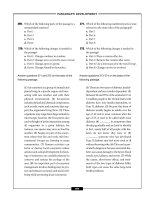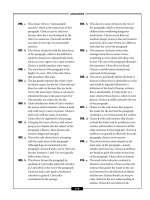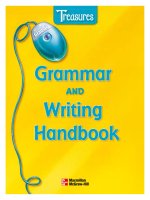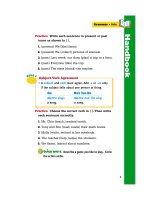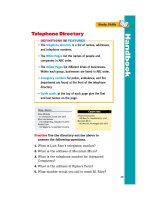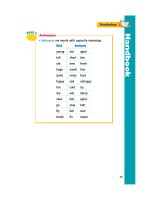treasures grammar and writing handbook grade 6 phần 9 pptx
Bạn đang xem bản rút gọn của tài liệu. Xem và tải ngay bản đầy đủ của tài liệu tại đây (753.5 KB, 28 trang )
Extra Practice
Adverbs That Modify
Adjectives and Adverbs
A. Write the word that is modified by each underlined adverb.
1. The park manager mailed us a completely revised brochure.
2. The summer activities were very clearly described.
3. By reading it incredibly carefully, I saw something interesting.
4. I was extremely excited about a new class, called AerobiKids.
5. The class was quite wisely offered on Saturday mornings.
6. The class was open only to kids aged ten to twelve.
7. An extremely enthusiastic instructor was to teach it.
8. The fee to enroll in the class was rather low.
9. My mom was remarkably
encouraging about my need to
enroll in the new class.
10. I was amazingly eager for the class to start!
B. Write the adverb and the word it modifies in each sentence.
11. I quite cheerfully jumped out of bed.
12. It was my very first day at AerobiKids.
13. My older sister quite kindly gave me a ride.
14. The room was very nearly packed with kids.
15. Our instructor was thoroughly perky.
16. She wore a really unusual microphone.
17. It was strapped remarkably tightly around her jaw.
18. It left her arms completely free to move.
19. She said our arms would be in almost constant motion.
20. Some of the exercises were too difficult for me.
C. Write each sentence. Underline each adverb that modifies an
adjective or another adverb. Write
ADJ above each modified
adjective. Write
ADV above each modified adverb.
21. The gymnastics teacher rather quickly taught us a new routine.
22. I was very confident in her gymnastic abilities.
23. I was somewhat nervous on my first attempt.
24. I know that my fitness will almost certainly improve.
25. After all the exercise, my legs are slightly sore today.
ADV
ADJ
ADJ
ADV
ADJ
quite; cheerfully
very; first
quite; kindly
very; nearly
thoroughly; perky
really; unusual
remarkably; tightly
completely; free
almost; constant
too; difficult
225
Extra Practice
Comparing with Adverbs
A. Write the correct comparative and superlative form of
each adverb.
B. Write each sentence. Use the correct form of the adverb.
11. Jason types (more skillfully, most skillfully) than Keith.
12. He updates our homepage the (faster, fastest) of all.
13. Kevin adds information (more quickly, most quickly) than Tory.
14. The teacher held a contest to see who could create the
(more beautifully, most beautifully) decorated Web page.
15. The (more carefully, most carefully) designed Web page of all
was done by Kim.
16. Hers was (more creatively, most creatively) done than Tory’s.
17. The (more humorously, most humorously) drawn cartoon of all
appeared on Diego’s Web page.
18. Carlo painted well, but Adriana painted (better, best).
19. Adriana added details (more frequently, most frequently) than
her classmates.
20. The (most amazingly, more amazingly) animated page
was Tina’s.
C. Write each sentence by using the correct form of the adverb
in parentheses.
21. Jason works the of all on the computer. (proficiently)
22. The three friends worked on Friday than they had
on Tuesday. (cooperatively)
more cooperatively
23. They worked at school than at home. (eagerly)
24. The sixth grade planned its project than the seventh
grade. (carefully)
more carefully
25. Making a Web page is one of the satisfying experiences.
(completely)
most completely
1. fast
2. soon
3. late
4. happily
5. well
6. smoothly
7. excitedly
8. sweetly
9. brightly
10. badly
more smoothly, most smoothly
more excitedly, most excitedly
more sweetly, most sweetly
more brightly, most brightly
worse, worst
faster, fastest
sooner, soonest
later, latest
more happily, most happily
better, best
more eagerly
most proficiently
226
Extra Practice
Negatives
A. Write the word that correctly completes each sentence.
1. Haven’t you (ever, never) heard of the dog known as
a Lhasa Apso?
2. Haven’t you ever read (any, no) books about dogs?
3. We didn’t have (any, no) trouble finding dog books.
4. I (could, couldn’t) hardly believe how much information I found.
5. We didn’t have (a, no) dog before we got Nikki.
6. We never had a cat, (either, neither).
7. We knew (anyone, no one) who had a Lhasa Apso.
8. My mother didn’t know of (any, no) breeders to contact.
9. We weren’t able to find (anything, nothing) about breeders in
the newspaper.
10. We didn’t learn (anything, nothing) from the Internet except
that Lhasa Apsos were from Tibet.
B. Write each sentence using the correct word.
11. You (can, can’t) hardly believe how entertaining Lhasas are!
12. I didn’t think (any, no) dog would be as loyal this one.
13. Nikki hasn’t (ever, never) forgotten to greet me.
14. I (can, can’t) hardly wait to get home to see her.
15. My dog isn’t (anything, nothing) like I imagined.
16. She doesn’t (never, ever) bark unless she’s lonely.
17. I try to (ever, never) leave her by herself.
18. We didn’t know (nothing, anything) about dogs.
19. I couldn’t think of (anyone, no one) who had a Lhasa.
20. I (could, couldn’t) hardly have expected such a great pet.
C. Rewrite each sentence. Correct the double negative.
21. I can’t hardly believe a small dog has such a loud bark! can
22. Nikki doesn’t never bark unless she’s alarmed. ever
23. My dog hardly never leaves her post at the front window. ever
24. She doesn’t bark or whine at no one. anyone
25. Nikki won’t ever bark at nobody. anybody
227
Extra Practice
Colons and Hyphens
A. Write each sentence or phrase correctly by adding a colon
or hyphen.
1. Dear Ms. Baker:
2. Dear Professor Rosenthal:
3. My sister-in-law, Cathy, is a gymnast.
4. The gymnast performs a state-of-the-art routine.
5. Cathy practiced her routine twenty-five times.
6. Jesse, Eduardo, and I are going to the last gym-
nastics meet.
7. Jesse called me about 800 last night to make plans.
8. Eduardo is a first-rate driver.
9. He drives an older, blue-green car.
10. His father is an attorney-at-law.
B. Write each sentence. Add a colon or a hyphen.
11. The gymnastics meet will begin at 1200. 12:00
12. Eduardo and I will pick up Jesse at 1115. 11:15
13. Eduardo would like to arrive at the meet by 1145. 11:45
14. We pulled up at Jesse’s two-story house.
15. Jesse’s green-eyed cat watched us from the window.
16. Since Eduardo has a two-door car, I jumped out.
17. Eduardo is twenty-one years old.
18. Jesse brought three things: a wallet, a cap, and a sweater.
19. Eduardo played his brand-new CD for us.
20. We arrived at the meet promptly at 1135. 11:35
C. Rewrite the letter. Add colons and hyphens where needed.
21–25. Dear Mrs. Ross:
We went to a gymnastics meet at 1200 today. We sat on the
left
-hand side of the gym, where my freckle-faced friend, Cathy,
was to perform her world-class floor routine. We saw the fol low
-
ing events: parallel bars, pommel horse, rings, and uneven bars.
Sincerely,
Tony
12:00
8:00
228
Extra Practice
Prepositions
A. Write the preposition in each sentence.
1. We’re studying the United States Constitution in school.
2. The Constitution plays an important role in our lives.
3. It promises specific rights to all United States citizens.
4. It outlines the basic laws and principles of our nation.
5. The United States Constitution was written in 1787.
6. The Constitution replaced the Articles of Confederation.
7. After the Revolution, it was feared that the country would
not last.
8. The country was then just a confederation of thirteen states.
9. Many important leaders gathered for a meeting.
10. Among themselves, they discussed the country’s problems.
B. Write the sentences. Circle the prepositions.
11. The finest representatives from each state came to the meeting.
12. The meeting was held in the city of Philadelphia.
13. The meeting was known as the Constitutional Convention.
14. It lasted from May through September.
15. George Washington came to the meeting from Virginia.
16. Benjamin Franklin was a famous citizen of Philadelphia.
17. Thomas Jefferson was not among those who gathered for
the meeting.
18. Jefferson was traveling in Europe during the meeting.
19. George Washington was elected president at the Convention.
20. The Convention was held in Independence Hall.
C. Write each sentence. Fill in the blank with a preposition that
makes sense.
Possible answers are given.
21. The Constitution had to be ratified nine states.
22. those who opposed the Constitution was Patrick Henry.
23. The first ten amendments were added 1791.
24. The first ten amendments are known the Bill of Rights.
25. Through the years, the Constitution has protected the rights
all people.
Among
in
by
as
of
229
Extra Practice
A. Write each sentence. Underline the adjective phrase.
Circle the noun or pronoun it modifies.
1. Ben read the myth on page 112.
2. The myth concerned the daughter of a king.
3. The king ruled the people of Jasmer.
4. His daughter was a woman of great speed.
5. She was fast and had a love of racing.
6. The daughter made a promise to her father.
7. She would marry a man with great running abilities.
8. Many with high hopes raced the princess.
9. The girl with incredible speed won every race.
10. One day the princess met a runner of great ability.
B. Write the word or words that each underlined adverb phrase
modifies. Label the word or words verb, adjective, or adverb.
11. Today’s orchestra rehearsal will be fun for Niko. fun—adj.
12. With great anticipation, he thinks about the rehearsal.
13. The orchestra consists of twelve students. consists—vb.
14. They rehearse after school. rehearse—vb.
15. The orchestra practices in the band room. practices—vb.
16. Niko arrives a bit early for the rehearsal. early—adv.
17. Niko places music stands around the room. places—vb.
18. Niko adds sheet music to the stands. adds—vb.
19. The other orchestra members come into the room. come—vb.
20. The group plays beautiful music for their teacher. plays—vb.
C. Write each sentence. Add a prepositional phrase in each blank.
21. The runner was the prince . of a nearby kingdom.
22. He was the mightiest runner . in the area.
23. The race ended in a tie. between them.
24. He tilted his head slightly . to one side
25. The race lasted . about eight minutes
Prepositional Phrases
thinks—vb.
Possible answers are given.
230
Extra Practice
Punctuation in Prepositional
Phrases and Interjections
A. Write the sentences. Add a comma or an exclamation point
to each sentence.
1. For our last field trip, we visited the Art Institute.
2. Before the trip, our art teacher discussed what we would see.
3. My goodness! We saw some beautiful photographs.
4. With an overhead projector, Ms. Lester shared her slides.
5. To prepare for our visit to the museum, we studied works of art.
6. Boy! I certainly learned a lot before we even went to the museum.
7. Of all the artists, I liked Vincent van Gogh the best.
8. Wow! He created many incredible self-portraits.
9. In some of the portraits, he looks quite sad.
10. In his eyes, you can see a sad expression.
B. Write each sentence. Add a comma or exclamation mark
to set off a prepositional phrase or an interjection.
11. Gosh! This is my favorite piece by Vincent van Gogh.
12. Wow! The painting First Steps always fascinates me.
13. With its pale colors, this painting has a soothing quality.
14. On the left side, a crouching man seems to be waiting.
15. With outstretched arms, he waits for a child.
16. Look! His spade is on the ground next to him.
17. Behind the child, a woman is holding the toddler by the arms.
18. My goodness! The woman is helping the child take his first steps.
19. With outstretched arms and an upright head, he looks determined.
20. Whoa! I think the baby’s first steps will be a success.
C. Write the sentences correctly.
21. Hey! Who’s your favorite artist?
22. Other than Vincent van Gogh, whom do you like?
23. From my point of view, van Gogh was the best artist of his time.
24. Wow I just love to study van Gogh’s lovely oil creations.
25. Oh I also like the art of Paul Gauguin. Oh, or Oh!
Wow, or Wow!
231
Build Skills
HijYnH`^aah
N
S
W
E
0
0
300 Miles
500 km
250
150
VICTORIA
ISLAND
BAFFIN
ISLAND
Whitehorse
Yellowknife
WESTERN
MOUNTAIN
REGION
PLAINS
REGION
Victoria
Edmonton
Regina
CANADIAN
SHIELD
GREENLAND
ATLANTIC
OCEAN
Toronto
Montreal
Halifax
NO
V
A S
C
O
TIA
Schefferville
Fredericton
ROCKY MOUNTAINS
Winnipeg
UNITED STATES
Thunder
Sudbury
National Capital
Other Cities
International Boundary
Coal
Ottawa
• A map is a drawing or a diagram of a place.
• Maps show the names and locations of cities, rivers, mountains,
and other important features of a geographical area.
• You can use the scale of miles, legend, and compass rose to
locate features and to determine distances and directions.
• An atlas is a reference book that contains maps and information
about geographical regions.
• Use the index of an atlas to find the map you need.
DEFINITIONS AND FEATURES
Practice Use the map to answer the following questions.
1. Which ocean is on Canada’s east coast? Atlantic
2. What is the national capital of Canada? How do you know?
3. In which region is Whitehorse? Western Mountain Region
4. What mineral is found in the Rocky Mountains? coal
5. In miles, what is the distance from Regina to Winnipeg?
Maps and Atlases
This map of Canada
is from an atlas, a
book of maps.
The key shows
what the symbols
on the map mean.
The scale of miles
helps you find the
distances between
places on the map.
The compass rose
indicates directions
on the map.
about 150 miles
Ottawa; the map legend symbol
232
Build Skills
HijYnH`^aah
Favorite Stories of 6th-Graders
Adventure
31%
Animal
Stories
19%
Humor
19%
Mysteries
18%
Science
Fiction
7%
History
6%
:&"3
Average Snowfall on Mount Flurry
4/08'" */*/$)&4
• A graph is a drawing that shows how kinds of information are
related. There are several kinds of graphs.
• A graph has a title and labels to help you understand the
information.
• There are several types of graphs. Circle graphs show
percentages of a larger number. Line graphs use lines to show
how numbers are related.
DEFINITIONS AND FEATURES
Graphs
Practice Use the graphs to answer the following questions.
1. Which types of stories were the most popular? adventure stories
2. Which types of stories were the least popular? history
3. What percentage of 6th-graders liked animal stories? 19%
4. In what year did the most snow fall on Mount Flurry? 1996
5. How many more inches of snow fell during 1995 than
during 1999?
20 inches
A graph is an
easy way to see
information at
a glance.
The title tells you
what information
is on the graphs.
The labels tell
you what the lines
on the graphs
represent.
Circle graphs
show percentages
of larger numbers.
233
Build Skills
HijYnH`^aah
• A dictionary gives the meanings and pronunciations of words.
• The words in dark type are called entry words. They are listed
alphabetically.
• The two guide words at the top of the page show the first and
last entry word on the page.
• The pronunciation key in the dictionary explains what the
pronunciation symbols mean.
DEFINITIONS AND FEATURES
Dictionary
Practice Use the dictionary entries to answer the questions.
1. Which word would appear before this page: granule, grammar,
or grape?
grammar
2. Which meaning of grand is used in this sentence? A grand
total of ten people attended my birthday party.
3. How many syllables does grandeur have? How do you know?
4. What part of speech is grandeur? noun
5. How can you tell that grandstand can be used as a verb?
two; they are divided by a dot
The word verb appears after the second definition.
meaning 3: including everything
Guide words
Entry word
Pronunciation
guide
Definitions
Part of speech
grand 1. large and impressive;
magnificent: We visited a grand
palace. 2. noble or dignified: The
judge was a grand person. 3.
including everything; complete: The
grand total of their winnings was
$3,000. 4. most important; main;
principal: The grand prize was a
trip to New York. grand (grand)
adjective; grander, grandest
grand/grant
grandeur 1. the state or quality
of being majestic or imposing;
magnificence; splendor.
gran
•deur (gran´ j
ә
r) noun.
grandstand The main place where
people sit when watching a parade
or sports event: The fans filled the
grandstand. Noun.
•To act in a way that is
unnecessarily showy to impress
others. Verb. grandstand
(grand´ stand´) noun,
plural grandstands; verb,
grandstanded, grandstanding.
234
Build Skills
HijYnH`^aah
Newspaper
article
Book
Magazine
article
• The bibliography is a list of all the sources you have used to
research and write a report. It may include books, articles, or
other media resources.
• The bibliography tells your readers where you found your
information and provides them with a guide to find out more.
• Entries are normally listed alphabetically by author. When no
author is given, list an entry by its title.
• The bibliography gives the names of the authors, the title of the
book or article, the publisher, the place of publication, and the
copyright date of the material.
DEFINITIONS AND FEATURES
Practice Use the sample bibliography to answer the following
questions.
1. Which company published Traditional Indian Games? Blue Hill
Group
2. When was Luisa Barna’s article published? April 15, 1999
3. In which source did the author find information about the
Kiowa tribe?
Native American Quarterly
4. Who co-wrote Sports and Cultures Around the World? Amy
Barrow and Lev Wolski
5. Which source is the oldest? When was it published? Native
American Sports, 1987
Bibliography
BIBLIOGRAPHY
Barna, Luisa. “Lacrosse Team Discovers Origins.” Jasper Daily
Gazette, April 15, 1999, p. 32.
Barrow, Amy and Lev Wolski. Sports and Cultures Around the World.
Putney, VT: Diverse Traditions, 1996.
Native American Sports. New York: Painted Feather Press, 1987.
Player, Stanley. “Kick and Score: Kiowa Stick Games.” Native
American Quarterly, Fall 1989, pp. 120–136.
Running Bear, Henry. Traditional Indian Games. Chicago: Blue Hill
Group, 2000.
235
Build Skills
HijYnH`^aah
Submit
Submit
9V^an E-News
September 30, 2000
Breaking News:
Water Found on Mars
Cure for the Common
Cold Discovered
Smith Announces
Run for President
Search the News
Enter date:
Enter topic:
• You can use a search engine to find a Web site about a specific
topic. Type in keywords, then press RETURN or click on the
SEARCH button.
• If your search turns up too many Web sites, refine your search
by typing in more specific words. You can also place the exact
words of your subject in quotation marks.
• You can search on-line newspapers to find news articles about
particular topics or articles that were published on a certain date.
• Many on-line encyclopedias have search engines you can use to
find articles about certain topics.
DEFINITIONS AND FEATURES
On-Line Searches
Practice Read each of the topics. Write search engine, on-line
newspaper, or on-line encyclopedia to name the best way to
search the Internet for information on that topic.
1. Yellowstone National Park on-line encyclopedia or search engine
2. the scores from baseball games played yesterday
3. general information about the circulatory system
4. what happened when Mount St. Helens erupted
5. addresses of museums in your city search engine
Enter a topic or
a date to search
for newspaper
articles.
on-line newspaper
on-line encyclopedia
encyclopedia, search engine
236
Build Skills
HijYnH`^aah
• When you are conducting research, remember to use two or more
sources to find and verify information.
• Match the resources you use to the purpose of your research.
An encyclopedia, for example, gives a brief overview of a topic,
while a nonfiction book may provide more in-depth information.
• Decide how current your information needs to be. Look at
copyright dates for the most up-to-date information.
• Besides books, use other sources of information, such as
interviews with experts, web sites, and videotapes.
DEFINITIONS AND FEATURES
Practice Read the following topics. Write nonfiction book,
magazine, newspaper, encyclopedia, videotape, interview, or
atlas to name the best source of information about that topic.
1. information about Mount Everest encyclopedia
2. a local zoologist’s tips on feeding birds that visit your yard
3. an article about regional lakes that are good for fishing magazine
4. the topic of the President’s latest speech newspaper
5. large amounts of in-depth information about track-and-field
events
nonfiction book
Reference Resources
Use two or more
resources to
support your
research.
A magazine
gives up-to-date
information
about topics.
Use an
encyclopedia
to find general
information
about a subject.
interview, newspaper
237
Build Skills
HijYnH`^aah
• An encyclopedia is either print or electronic, and includes
information about people, places, things, and events.
• Encyclopedia articles are about specific topics. In print versions,
they are in books called volumes. Encyclopedia volumes are
arranged in alphabetical order.
• Encyclopedia articles are arranged in alphabetical order by
keywords. Each keyword is the main topic of an article. Search
for a person by last name, unless they have only one name.
DEFINITIONS AND FEATURES
Encyclopedia
Practice Write the keyword that you would use to find
information about each subject. Then write the number
of the volume in which you would find the entry.
1. the names of Michelangelo’s most famous works of art
2. the history of the South American country Bolivia Bolivia; 2
3. how the human eye works eye; 6
4. the principal exports of Peru Peru; 15
5. Indira Gandhi’s place in world history Gandhi; 8
In this volume,
you will find
topics that
begin with W,
X, Y, and Z.
Vikings
Topics:
Current Events
History
Literature
Science
Find:
SUBMIT
CD ROM ENCYCLOPEDIA
When you click on the
“Submit” button, an article
about Vikings will appear.
Michelangelo; 13
238
Build Skills
HijYnH`^aah
• A library or a media center includes a variety of materials and
resources arranged in different sections.
• The card catalog is an alphabetical listing of the materials in the
library. It may be in drawers or on a computerized database.
• The Dewey Decimal classification system sorts materials into ten
main subject classes. The call numbers help you locate books.
Fiction is arranged alphabetically.
• A periodical is a magazine or journal. The Readers’ Guide to
Periodical Literature lists every periodical in the library.
• The reference section includes books for research such as
encyclopedias, atlases, dictionaries, and almanacs.
DEFINITIONS AND FEATURES
Practice Look at the floor plan above. Write where you would
find each of the following items in the library.
1. a science CD-ROM audiovisual section
2. a collection of short stories bookshelves
3. the current issue of Time magazine periodicals, or magazines section
4. a videotape about grizzly bears audiovisual section
5. a thesaurus reference section
Library Media Center
"VEJPUBQFT
7JEFPUBQFT
$%T4PGUXBSF
$PNQVUF
ST
'JDUJPO
3FGFSFODF#PPLT
/POGJDUJPO
/FXTQBQFST
.BHB[JOFT
*OGPSNBUJPO
%FTL
$BSE$BUBMPH
$JSDVMBUJPO%FTL
Bookshelves. These
hold fiction and
nonfiction books.
Circulation Desk—
where you check
out materials
Card catalog
Reference section
Periodicals section
Audiovisual
Materials
239
Build Skills
HijYnH`^aah
• The card catalog is an alphabetical list of the materials that you
can find in a particular library. Most libraries have electronic card
catalogs.
• The entries are arranged by title, by author, and by subject. You
can search for materials using only subject words if you do not
know the titles or authors of books about certain topics.
• The computerized entries tell you where to find the materials.
The call numbers tell you locations on the bookshelves.
• Some libraries have printed card catalogs. Entries are filed in
drawers. The drawers are arranged alphabetically.
DEFINITIONS AND FEATURES
Card Catalog
Practice Write a keyword for each of the subjects below with
which you could conduct an on-line catalog search.
1. the San people of Australia Australia
2. the U.S. Civil War battle of Antietam Civil War; Antietam
3. treasures found in King Tutankhamen’s tomb in Egypt
4. Julius Caesar, Roman Emperor Caesar
5. Alexander Graham Bell’s invention of the telephone Bell; telephone
Mythology-Juvenile literature
398.2
Verniero, Joan C. and Fitzsimmons, Robin
One Hundred and One Read-Aloud Myths and Legends
New York: Black Dog & Leventhal, 1999
1. Mythology-Juvenile literature
2. Legends and folktales-Juvenile literature
ISBN 1-579912-057-1
Subject heading
Book title
Subject headings
Publisher’s name,
date, and place of
publication
Call number
Authors’ names
Possible answers are given.
Tutankhamen; Egypt
240
Build Skills
HijYnH`^aah
• Write questions you want to answer about the topic. Think of
sources that will help you answer your questions.
• You can take notes from written material or a speaker for a
research report. Use note cards.
• Put quotation marks around the author’s exact words.
Summarize the author’s points in your own words when possible.
• Use your note cards to create an outline. Organize ideas by main
topics and subtopics.
• Use your outline as a guide as you write your report.
DEFINITIONS AND FEATURES
Practice Answer the following questions.
1. After you identify a topic, what should you do to guide your
research?
write questions that need to be answered
2. Why would you want to use more than one source?
3. From what source are these notes taken?
4. What question does the researcher want answered?
5. Why is it important to take notes?
Note-Taking
Robert Hendrickson, Encyclopedia of Word and Phrase Origins
(New York: Facts on File, Inc., 1997), p. 236.
Wyoming—
Called the Equality State: Territorial Legislature was the first
to grant women the vote in 1863.
Called Suffrage State for
same reason.
Source of notes
Notes in note-
taker’s words
rather than
author’s
Possible answers are given.
to check facts; to get lots of information
Encyclopedia of Word and Phrase Origins
Why is Wyoming called the “Equality State”?
to remember what you have read so you can include it in your report
241
Build Skills
HijYnH`^aah
Interview with Dr. Moses date: January 23, 2001
time: 3:45
PM
Purpose: To find out as much as I can about becoming
a veterinarian
Questions: 1. What is a veterinarian?
2. What training is needed?
3. What is a typical day like for you?
4. What do you like most about your profession?
• An interview is a conversation between two or more people that
can be an important part of research.
• The interviewer is the person who asks the questions.
• The subject of the interview is the person being questioned.
• Prepare simple and direct interview questions before you begin.
Some questions will occur to you during the interview.
• Use notecards to record questions and answers during the
interview. Use a tape recorder, if possible.
DEFINITIONS AND FEATURES
Practice Write two questions you would ask each of these
people in an interview.
Possible answers are given.
1. your student council president
2. the mayor of your town or city
3. the school nurse
4. the President of the United States
5. a local police officer
Interviews
Name of
subject
Purpose of
the interview
Always have
plenty of questions
prepared in advance.
Leave space between
your questions for
taking notes during
the interview.
What changes would you like to see occur this school year?
What is a normal day like for you?
What do you like most about your job?
What is it like to live in the White House?
How can I start a neighborhood watch program?
Date and time of the interview.
242
Build Skills
HijYnH`^aah
• A periodical is a newspaper, magazine, or journal published
at regular intervals, such as weekly, monthly, or quarterly.
Periodicals provide current information about topics.
• The Readers’ Guide to Periodical Literature is a set of books or an
electronic database that alphabetically lists, by topic or author,
articles published in periodicals. It identifies the magazine,
issue, and page where an article can be found.
• You can use a newspaper index to find newspaper articles about
topics or by particular authors.
• Media resources are nonprint resources that you can use to find
information, such as CD-ROMs, videotapes, and audiotapes.
DEFINITIONS AND FEATURES
Sample Readers’ Guide Page
Periodicals
Practice After each number in parentheses is a different part of a
page from the Readers’ Guide. Number your paper from 1 to 10.
Identify the different parts of these Readers’ Guide entries.
Subject entry
Author’s name
Volume number
Article title
Periodical name
“See also” gives
cross-referencing
information
Page number(s)
Year of publication
(1) Tornadoes
(2) “Terrible Twisters.” (3) Monique Cline (4) Time
(5) 77:100-01 Ap ’99
“Tornado Hits Little Rock.”
(6) Dierdre Scotti Newsweek (7) 83: (8) 82–91
(9) Je ’99 (10) See also Storms
Egyptian art
“Treasures from the Age of Pyramids.” Bennett Schiff Smithsonian
30:108–19 S ’99
See also Pyramid art
1. subject entry; 2. article title; 3. author name; 4. periodical name;
5. volume #; 6. author and periodical name; 7. volume #; 8. page #; 9. date of
publication; 10. cross-reference information
243
Build Skills
Vocabulary
• A time-order word explains the order in which events take place
or tells when events occur.
• Sometimes a phrase can show time order in a piece of writing.
Time-Order Words and Phrases
first as soon as now
second today meanwhile
third yesterday before
next tomorrow after
last finally long ago
Time-Order Words
• Language changes to meet the needs of people—new discoveries
and new ideas demand new vocabulary.
• New words can be formed in different ways.
Type of Word Definition Examples
Compound Word two or more air + port = airport
short words control + tower = control tower
combined
Clipped Word shortened form airplane plane
of other word champion champ
Blended Word two words smoke + fog = smog
combined with breakfast + lunch = brunch
some letters
deleted
Borrowed Word word from ranch (Spanish)
language other moccasins (Algonquin)
than English
How Language Changes
244
Build Skills
Vocabulary
• Synonyms are words that have the same or almost the same
meanings.
• Antonyms are words that have opposite meanings.
• A word may have more than one synonym or antonym.
Word Synonym Antonym
towering tall short
ancient old modern
empty vacant full
bright sparkling dull
magnificent splendid shabby
roomy spacious cramped
Synonyms and Antonyms
• A prefix is a word part added to the beginning of a base word.
• A suffix is a word part added to the end of a base word.
• Adding a prefix or suffix changes the meaning of the base word
to which it is added.
Prefix Meaning Suffix Meaning
re- again, back -er, -or one who, that which
un-, dis-, non- not, the opposite of -ful full of
mis- wrongly, badly -able, -ible capable of, fit for
pre- before -ness state or quality of
bi- having two of; twice -less without, not having
im-, in- not, without, in, into -ist one who works at
post- after -ment the act, state,
quality, or result of
ex- previous -ward moving or tending
towards
Prefixes and Suffixes
245
Build Skills
Vocabulary
• Roots are word parts to which suffixes, prefixes, and other word
parts can be added.
• You can figure out the meaning of a word by figuring out the
meanings of the root, prefix, and suffix.
Roots Meaning Example
aud “to hear” auditorium, audience, audible
dict “to tell” dictionary, dictate, diction, predict
loc “place” local, relocate, location
ped “foot” pedometer, pedestrian, pedal
port “carry” support, report, portable, import, export
pose “to put” compose, position, repose
spect “to look” inspect, inspector, spectator
scribe, script “to write” describe, scribble, manuscript, description
Roots
246
Build Skills
Vocabulary
• Good word choice depends on knowing the differences between
words.
• Choose the word that most precisely expresses the meaning you
intend.
• You might need to choose between synonyms, words that have
the same or almost the same meaning.
• Some synonyms have different connotations. A connotation is the
shade of meaning, or the feeling or overtone, created by a word.
• A connotation may be positive (inexpensive) or negative (cheap).
Positive Connotation Negative Connotation
lively rowdy
thrifty stingy
slender bony
aroma stench
curious nosy
relax loaf
antique old
clever tricky
perform show off
crowd mob
Word Choice
247
Build Skills
Vocabulary
• The English language includes some confusing words that are often
misused. The charts show how these words are used properly.
Problem Words
Words Correct Usage
accept
Accept means “to receive” or “to agree to.” It is a verb.
I accept your apology.
except
Except means “other than.” It is usually a preposition.
I like all vegetables except Brussels sprouts.
affect
Affect is a verb that means “to influence.”
Your study habits will affect your grades.
effect
Effect is a noun. It means “result or outcome.”
The icy bridges are an effect of freezing temperatures.
all ready
All ready means “all prepared.”
The students were all ready to get on the bus.
already
Already is an adverb that means “previously.”
The teachers had already left.
beside
Beside means “on the side of.”
Our car is beside the curb.
besides
Besides means “in addition to.”
At the party, we will offer foods besides chicken.
can
Can tells about an ability.
Juan can run faster than me.
may
May expresses permission.
You may go outside when you finish your homework.
fewer
Fewer is used for things that can be counted.
Sara has fewer pencils than Janice.
less
Less is used for things or ideas that cannot be counted.
I am less athletic than Rene is.
good
Good is an adjective that describes something positive.
Brian’s painting was very good.
well
Well is usually an adverb. It gives more information
about the verb by telling “how.”
My little sister has learned to read quite well.
248
Build Skills
Vocabulary
Problem Words
Words Correct Usage
lay
Lay means “to put something down.”
Lay the towels on the table.
lie
Lie means “to recline or rest.”
Lie on the blanket and look up at the stars.
many
Many is used with nouns that can be counted.
Alex planned many games for the party guests.
much
Much is used with nouns that cannot be counted.
There was much laughter during the party.
precede
Precede means “to come or go before someone or
something.”
The sixth graders will precede the fifth graders in
the parade.
proceed
Proceed means “to go on, usually without interruption.”
You may now proceed with the test.
principal
Principal refers to the “head officer of a school.”
Mr. Wright is our school principal.
principle
A principle is “a basic truth or law by which a person
lives.”
Our country is based on a principle of individual rights.
raise
Raise means “to cause to move upward.”
The boys want to raise the height of the basketball goal.
rise
Rise means “to move upward.”
Let’s blow bubbles and watch them rise.
set
Set means “to put something down or in a certain place.”
I set my drink on the table.
sit
Sit means “to be seated.”
Please sit down so we can start class.
Write some sentences with problem words. Erase the
problem words and exchange papers with a friend. Try to decide what word
goes in each blank.
Q
UCK
WRITE
Q
UCK
WRITE
249

